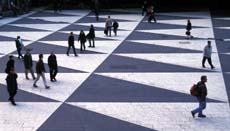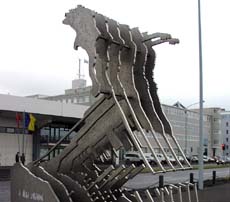click on images for full-size:

China, at Tivoli in Copenhagen

Towers at Seaside, Florida

Modern lonliness and homelessness (plaza, Stockholm

Self-consciousness as process (sculpture, Reykjavik, Iceland)

Places with complex history (Georgia O'Keefe's house at Ghost Ranch, New Mexico)
In writing this I wanted to look at the kinds of places we are living in today, and ask how they could be improved, without thinking only in terms of classical kinds of unity. So I went off to theme parks and New Urbanist villages, and wondered about how we could improve suburban
dispersal. I found that much of the criticism I read was based on faulty dualities.
I also wanted to say something about how
the modern sense of homelessness wasn't quite what some critics said it was.
I have more general goals as well, since places make a wonderful study of change and intersection of identities through changes in social grammars. I wanted to look at how sets of possibilities get established and changed, producing new kinds of relevance and contrast and norms. I wasn't trying to offer algorithms for solutions, but rather some cautions about constricted ways of thinking about our places and our identities today.
For instance, I wanted to fight against restricting the general debate to the two familiar options, namely that social norms and forms are either there from the beginning (factual, positive, original, natural, etc.) or else are arbitrarily established by some act of subjectivity (individual or social, or divine).
This relates to the old fight against the fact/value dichotomy, and against a related but less famous dichotomy of passive data facing active forces, or
passive content manipulated by active subjectivity.
In our situation today the problem is not so much particularity versus universality, but positivity versus process. We should not be forced to choose between particularity and universality; that is the wrong way to put questions about modernity and tradition. It is wrong to think in terms of some given particularity but also wrong to think in terms of some universality that is just given, either as passive or active.
Modernity does mean a new kind of self-awareness, but that is not so much of some universal position but of the process that generates positions. That process isn't itself a position we can take: it isn't pure, and our self-awareness of it isn't that of a self facing a direct object; yet that awareness does influence what social grammars we can accept or create now.
Places are a wonderful topic for broaching these issues, since places are emphatically factual yet also socially meaningful and historically changing. They show the way we are thrown into already operative dimensions of
linked possibility within the process of self and social identity formation and change.
- [Nearby: Gateway -- Selves as active and passive -- I want to say more ]




